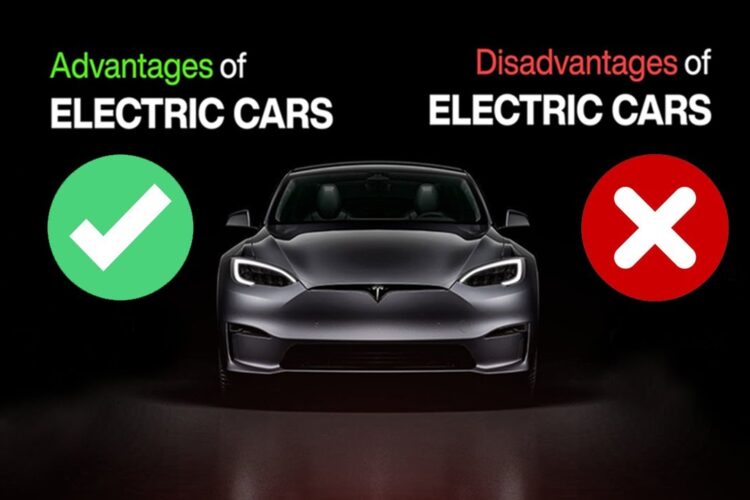Electric vehicles (EVs) have become increasingly popular as an alternative to traditional gasoline-powered cars. While they offer several benefits, such as reducing greenhouse gas emissions, they also have some drawbacks. Here are the merits and demerits of Electric cars and other Evs:
Check: Romantic Quotes
Also read: How to Block all Websites Notification and Chrome Ads from Browsing History
Merits of Electric Cars:

- Environmentally Friendly: EVs produce no tailpipe emissions, meaning they don’t emit pollutants that can harm the environment and contribute to climate change.
- Lower Operating Costs: EVs cost less to operate than gasoline-powered cars because they require less maintenance and have lower fuel costs.
- Quieter and Smoother Ride: EVs are quieter and have a smoother ride because they have fewer moving parts than gasoline-powered cars, which means there is less noise and vibration.
- Energy Efficient: EVs are more energy-efficient than gasoline-powered cars because they convert more of the energy stored in their batteries into motion, rather than wasting it as heat.
- Tax Incentives: Many governments offer tax incentives to encourage people to buy EVs, which can reduce the overall cost of ownership.
- Low Maintenance Costs: EVs have fewer moving parts than gasoline-powered cars, which means there is less wear and tear and fewer parts to maintain or replace. This can lead to lower maintenance costs over the lifetime of the vehicle.
- Home Charging Convenience: EV owners can charge their vehicles at home, which is convenient and saves time compared to having to visit a gas station. This is especially true for those who have access to fast chargers, which can fully charge an EV in a matter of hours.
- Improved Air Quality: EVs can help to improve air quality in urban areas because they produce fewer pollutants than gasoline-powered cars, which can have positive impacts on public health.
- Versatile Design: EVs are not limited by the traditional design constraints of gasoline-powered cars, which means they can be built with unique features such as dual motors for all-wheel drive, a flat floor, and more spacious interiors.
- Smooth and Quiet Operation: EVs offer a smooth and quiet driving experience, which can make them more comfortable to drive and improve the overall driving experience for passengers. Additionally, the lack of engine noise can help to reduce driver fatigue on longer trips.
- Reduced Dependence on Oil: EVs reduce our dependence on foreign oil and help to promote energy independence.
- Lower Carbon Footprint: EVs produce fewer greenhouse gas emissions than gasoline-powered cars, which helps to reduce our carbon footprint.
- Regenerative Braking: EVs use regenerative braking technology, which converts kinetic energy back into electricity to recharge the battery, increasing overall efficiency.
- Instant Torque: EVs provide instant torque, which means they can accelerate faster than gasoline-powered cars.
- Lower Noise Pollution: EVs produce less noise pollution than gasoline-powered cars, which can help to improve the quality of life in urban areas.
Demerits of EVs:
- Limited Range: EVs have a limited range, which can make them less practical for long-distance travel. However, this is improving as new models are being released with longer ranges.
- Longer Charging Time: It takes longer to charge an EV than to refuel a gasoline-powered car. Although, rapid charging stations can charge an EV quickly, but not all EV models support fast charging.
- High Upfront Costs: EVs are generally more expensive to buy than gasoline-powered cars, although this is also improving as battery prices continue to drop.
- Battery Replacement Costs: EVs require expensive battery replacements when their batteries wear out. While battery life is improving, and costs are dropping, battery replacement is still a significant expense.
- Limited Availability: While EVs are becoming more widely available, there are still fewer models to choose from, which can make it more difficult to find the right one for your needs.
- Battery Degradation: Over time, the battery in an EV will degrade, reducing the driving range of the vehicle and potentially requiring costly battery replacements.
- Weight and Size: EVs tend to be heavier and larger than gasoline-powered cars because of the added weight of the battery pack, which can affect handling and performance.
- Limited Model Options: There are fewer options for EVs compared to gasoline-powered cars, which may limit consumer choice.
- Charging Infrastructure Costs: Building and maintaining a network of charging stations can be costly, which could make it challenging to expand the charging infrastructure as EV adoption grows.
- Cold Weather Performance: EVs can experience reduced performance in cold weather because low temperatures can reduce the efficiency of the battery and affect the range of the vehicle.
- Recycling Challenges: EV batteries contain materials that can be challenging to recycle, which could create environmental concerns if a large number of EVs reach the end of their life at the same time.
In summary, EVs offer several benefits, such as being environmentally friendly, having lower operating costs, and being energy-efficient. However, they also have some drawbacks, such as limited range, longer charging time, high upfront costs, and battery replacement costs.
Check: Collage Reviews
Also read: Wonders of Windows 11 23H2: Deep Dive into 5 New Upgrades






